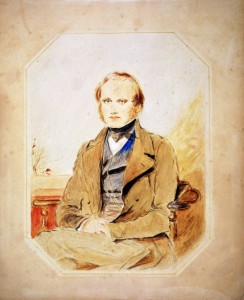 Charles Darwin was a 19th-century British biologist, naturalist and geologist. He is considered by many to be one of the most prominent figures in the history of mankind. His groundbreaking book “On the Origin of Species” was published in 1859. It included significant evidence supporting the theory of evolution. Darwin’s work was revolutionary and somewhat controversial for his time.
Charles Darwin was a 19th-century British biologist, naturalist and geologist. He is considered by many to be one of the most prominent figures in the history of mankind. His groundbreaking book “On the Origin of Species” was published in 1859. It included significant evidence supporting the theory of evolution. Darwin’s work was revolutionary and somewhat controversial for his time.
Early Life
Darwin was born in 1809 in Shrewsbury, England, which is approximately one hour northwest of Birmingham. His parents were Robert Darwin, a wealthy society doctor, and Susannah Darwin. As a teenager, Darwin worked as an apprentice doctor alongside his father before going to medical school. Early on, he began to disregard his medical studies because he thought they were boring. Darwin’s interests migrated to natural history, taxidermy and the anatomy of invertebrates. This annoyed his father, who pulled him out of medical school and sent him to Cambridge University to become an Anglican priest. Darwin did well at Cambridge, but also found time to study entomology and botany.
Shortly after graduation, Darwin was invited by his Cambridge botany professor to join an around-the-world expedition on the HMS Beagle. His father was opposed, but eventually relented. The five-year voyage on the Beagle took Darwin around the coast of South America, to the Galapagos Islands, Australia and South Africa. The discoveries and specimens Darwin amassed on the trip were highly influential in shaping his later theories on evolution.
Religious Views
Darwin’s religious views appear to have developed over time. While he attended Cambridge and studied to become a member of the clergy, Darwin was described as not doubting the Bible. During his time at Cambridge, he was thought to believe in intelligent design—a theory asserting that life and the universe were not created by chance, but by the deliberate work of an intelligent being (most likely God).
After he returned from his five-year voyage on the Beagle, Darwin’s views had changed. He no longer thought the Bible was irrefutable and questioned why every religion was not equally legitimate. His belief in Christianity continued to fade over the years, and he eventually stopped attending church. Darwin’s doubts about Christianity are thought to have been furthered by the death of his 10-year-old daughter in 1851, which devastated the family. In 1879 he wrote, “I have never been an atheist in the sense of denying the existence of a God. – I think generally … an agnostic would be the most correct description of my state of mind.” An agnostic believes it is impossible to know whether or not God exists.
Commemoration
Charles Darwin’s life and work are commemorated in many ways, including:
- Darwin Day is celebrated every year on February 12, which is his birthday. It was started in the 1990s and is designed to memorialize Darwin’s contributions and advance the field of science in general. Different events are organized around the globe. Sometimes Abraham Lincoln is honored as well, since he was born on the same day and year as Charles Darwin.
- Darwin’s picture is featured on one side of the British 10 pound banknote.
- Darwin College at Cambridge University is named for his family.
- Over 120 species and nine genera are named after him.
- A life-size statue of Darwin is located in London at the National History Museum.
- A seated statue of Darwin can be found in front of Shrewsbury Library, the former home of Shrewsbury School, which he once attended.
- He is buried at Westminster Abbey, an honor typically reserved for English monarchs with a handful of notable exceptions. Sir Isaac Newton is buried nearby.
Charles Darwin is one of the giants in the scope of human history. His work has had a huge impact on the scientific and religious beliefs of countless people.

